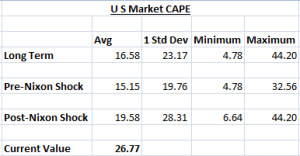One of the constant thesis I hear about US Markets is that they are way over-valued (and hence should fall anytime soon). This mantra is accompanied by a chart of the long term cyclically adjusted price earnings chart (CAPE), with data from Robert Shiller.
But I wonder, is the long term average really meaningful. The data starts from 1881 (1st data point for CAPE) and for the next 91 years, the currency was pegged (more or less) to Gold. Its been 45 years from the time Nixon de-linked US Dollar from Gold.
If one calculates the Average and Standard Deviations of both those periods, one finds that while based on pure long term CAPE, we are bit above the 1 Standard Deviation, if we were to split the period, we actually end up below the 1 Standard Deviation.
While CAPE more or less peaked out at 27.50 in mid 2007, the average for the period between 2003 and 2007 (Dec) comes to 25.91. Anyone who felt markets were expensive in relation to the historical past would have had to miss the entire rally.

While I agree US S & P 500 is not over-valued I always believed CAPE is not a great tool for understanding valuation of Equity Market. CAPE is primarily based on Inflation rate which I do not think is directly correlated with Equity asset class. E.g. S & P 500 Earnings contains lot of Productivity gains every year due to say US companies’ out-sourcing of mfg to china, IT to India etc. This makes CAPE less effective. I still find 1-year forward PE a better parameter for equity valuation.
However, Inflation is strongly correlated with Real assets like Property and you can clearly establish correlation of Inflation with Property prices as Land and Labour can NOT be out-sourced.
The biggest problem with Forward Earnings is that you are throwing a dart and hoping it will land right.
Yeah, CAPE has its issues as the blog philosophicaleconomics.com showcased some time back, but lack of any other suitable measure means that this will be used for now as the best possible way to measure the markets relatively speaking.